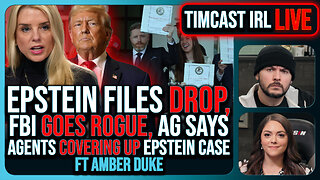Premium Only Content

The UN’s 2030 Agenda Falters, Youth Targeted in 'Summit of the Future'
https://vrijheidsberoving.nl/
New York City – The United Nations’ grand vision for a sustainable future, known as the 2030 Agenda, is drastically behind schedule, sparking concern and prompting a shift in strategy. The recent ‘Summit of the Future’ has emerged as a pivotal moment where global leaders convene to reset their approach, focusing on young people to spearhead transformative change.
In a recent interview on The Highwire, investigative journalist Jefferey Jaxen discussed the alarming implications of this shift with host Del Bigtree. The UN’s report on its Sustainable Development Goals (SDGs) reveals a stark reality: only 17% of their targets are on track to be met by 2030. In response, the UN appears to be taking drastic action, focusing heavily on youth engagement and policy reform.
A Strategic Pivot: The 'Summit of the Future'
The Summit, which has drawn attention on Capitol Hill, has been described as a crucial moment for the UN to recalibrate its approach. According to Jaxen, the summit aims to produce an “intergovernmental, action-oriented pact for the future,” signaling the organization's desire to elevate its global governance structure. The proposed policies and initiatives suggest an increasing concentration of power within the UN, including plans for broad authority over global emergencies like climate change, health crises, and cyber threats.
“They don’t want America to be governed by its Constitution,” said Jaxen, “but rather by the UN, the World Health Organization (WHO), and other global agencies.” He warned that the summit’s agenda extends beyond dialogue, with real policy decisions on the table, including declarations that could reshape global governance.
Empowering Youth: A Page from History?
One of the most striking aspects of the UN’s pivot is its focus on young people. According to official messaging from the summit, youth must "lead the way" in addressing global challenges. This shift mirrors a historic playbook—evoking comparisons to Mao Zedong's Cultural Revolution in China during the 1960s, where children, molded into the infamous “Red Guards,” were mobilized to drive radical social change.
Jaxen highlighted the UN’s emphasis on “whole society approaches” to climate justice and global governance, including a digital compact aimed at controlling information and combating disinformation. This targeting of youth, Jaxen argued, could lead to a disturbing repeat of history. “What we’re seeing now is a dangerous strategy to indoctrinate young minds, much like the Cultural Revolution,” he said.
Net Zero, Global Policies, and a 'War on Farmers'
The UN’s Agenda 2030 is rooted in its SDGs, which Jaxen contends disguise draconian policies under the banner of sustainability. These goals, ranging from reducing carbon emissions to eradicating poverty, require a radical transformation of global economies. Critics, including Jaxen, claim that such policies threaten private property rights, agricultural freedom, and economic independence.
“The global war on farmers, the push for net-zero emissions, the cutting of fertilizer—these are all part of the same agenda,” he said. “This isn’t just about climate; it’s about restructuring society, and it’s failing.”
The Push for Digital Control
Among the most concerning aspects of the summit is the proposal for a Global Digital Compact, which Jaxen believes could serve as a tool for censoring dissent. The compact includes provisions on "information integrity," which could give global bodies the authority to police misinformation, a term Jaxen notes is often used to stifle political opposition.
The UN’s recent messaging also prioritizes collective responsibility over individualism, an idea Jaxen finds alarming. “The idea that individualism must be fixed to solve climate anxiety is chilling,” he said, referencing media outlets that have echoed this sentiment. “This isn’t just about governance; it’s about controlling thought.”
Looking Forward: A Fight for Freedom?
For Jaxen and Bigtree, the real concern lies in what they see as a coordinated effort to erode national sovereignty and personal freedoms. “This is about global governance,” Jaxen stated, “and they are losing.”
While the UN’s progress is faltering, its pivot to youth-led governance could have far-reaching consequences. “This is their last-ditch effort,” Jaxen concluded. “But we’re waking up—there’s still time to fight back.”
As the world watches the UN’s next moves, critics argue that vigilance is essential to prevent what they see as an unprecedented global power grab.
-
 33:56
33:56
The Why Files
9 days agoLegend of the 13 Crystal Skulls | From Mars to the Maya
57.9K37 -
 2:56:14
2:56:14
TimcastIRL
6 hours agoEPSTEIN Files DROP, FBI GOES ROGUE, AG Says They COVERED UP Epstein Case w/Amber Duke | Timcast IRL
176K93 -
 1:39:23
1:39:23
Kim Iversen
7 hours ago"Canada's Trump" Is Trudeau’s Worst Nightmare: Is Maxime Bernier the Future of Canada?
69.6K72 -
 DVR
DVR
Bannons War Room
10 days agoWarRoom Live
2.66M446 -
 16:06
16:06
The Rubin Report
13 hours agoProof the Islamist Threat in England Can No Longer Be Ignored | Winston Marshall
85.7K82 -
 2:07:07
2:07:07
Robert Gouveia
10 hours agoFBI Files Coverup! Bondi FURIOUS; SCOTUS Stops Judge; Special Counsel; FBI Does
110K84 -
 56:15
56:15
Candace Show Podcast
11 hours agoBREAKING: My FIRST Prison Phone Call With Harvey Weinstein | Candace Ep 153
168K112 -
 1:56:39
1:56:39
Flyover Conservatives
9 hours agoROBIN D. BULLOCK | Prophetic Warning: 2030 Is Up for Grabs – If We Don’t Act Now, Disaster Awaits! | FOC SHOW
57.9K10 -
 2:13:11
2:13:11
megimu32
7 hours agoON THE SUBJECT: The Epstein List & Disney Channel Original Movies Nostalgia!!
44.6K5 -
 9:06
9:06
Colion Noir
16 hours agoKid With Gun Shoots & Kills 2 Armed Robbers During Home Invasion
56.9K13